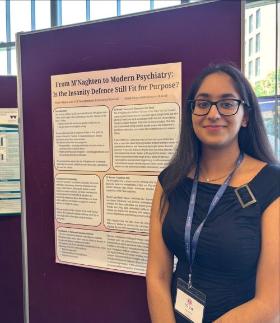Warwick Law School News
Warwick Law School News
The latest updates from our department
WLS students share experience of participating at the International Conference of Undergraduate Research 2025
We are delighted to share the experience of two of our law students who recently participated at the International Conference of Undergraduate Research (ICUR), which was hosted by the University of Warwick on 18-19 June 2025.
Final year LLB student Lidia Stan and second year LLB student Kiran Vekaria, were amongst five WLS students presenting at the conference last month.
ICUR, established through a collaboration between staff at Monash University and the University of Warwick in 2013, is a prestigious platform for undergraduate students from around the world to present their research. ICUR aims to foster a global scholarly community by enabling students to share their findings, engage in intellectual discussions, and develop their presentation and communication skills in an international setting.
We caught up with them to find out a little more about their research and time at the event.
Lidia’s Research: The Right to Die?
|
My dissertation, “How would the legalisation of euthanasia impact the existing legal framework in the UK, particularly the rights to life and autonomy?”, explores the potential effects of legalising assisted dying in the UK. The research focuses on the interplay between individual autonomy and state responsibility under the Human Rights Act 1998, particularly Articles 2 and 8 of the European Convention on Human Rights. Through a comparative analysis with jurisdictions such as Canada, the Netherlands, and Belgium, I propose a balanced regulatory framework that addresses ethical concerns while safeguarding vulnerable individuals. This topic has become even more relevant in light of recent news that UK MPs have voted in favour of legalising euthanasia by a margin of 23 votes — highlighting the growing momentum for change and the importance of engaging with the legal, ethical, and societal dimensions of the debate. After attending the conference, Lidia told us: |
 |
“It was an honour to present at ICUR and be part of a global academic community. The experience was both inspiring and empowering — I had the chance to speak to students and staff from all over the world, each bringing unique perspectives to the discussion.
One of the highlights for me was the interdisciplinary nature of the conference. Engaging with participants from different academic backgrounds helped me think more critically about my own work and how to communicate legal research to a non-legal audience.
I would highly recommend ICUR to anyone looking to grow in confidence, connect across disciplines, and contribute meaningfully to international academic conversations.”
Download Lidia's ICUR Presentation.Link opens in a new window
Kiran's Research: From M’Naghten to Modern Psychiatry: Is the Insanity Defence Still Fit for Purpose
|
My research was inspired by learning about the criminal law insanity defence in first year, taught by Professor Alan Norrie. Later, through the IATL module Navigating Psychopathology, I developed this initial interest into a deeper interdisciplinary critique, exploring how and why the current M’Naghten rules governing the defence are outdated and why reforming them matters. My project firstly explored the purpose of the insanity defence: to balance the fair consideration of mental illness in an individual’s trial with protection of public safety. It then delved into how the M’Naghten rules are outdated, from its outdated terminology and growing disconnect from modern psychiatric understandings of mental illness and their impact on human behaviour. It concluded to explain why the Law Commission’s proposed reform of the defence (Not Guilty by Reason of Recognised Medical Condition) would prove to be more suitable in allowing the insanity defence to fulfil its intended purpose. When asked about her experience at ICUR, Kiran shared: |
 |
“Learning to explain my work in layman’s terms, accessible to any audience, strengthened my communication skills – skills that are crucial in a future legal career when working with clients. It also helped me gain a deeper understanding of my own research.
The setting at ICUR encouraged insightful questions, many of which seemed straightforward at first but prompted me to reflect more critically and view my research from new angles. I had a particularly engaging conversation with a student from a medical background on whether a legal or medical approach to capacity under the insanity defence would be most suitable.
ICUR is a valuable experience for any student looking to refine their communication skills and gain fresh perspectives on their own research.”
View Kiran's ICUR Poster.Link opens in a new window
Find out more
- Discover more about the International Conference of Undergraduate Research (ICUR) 2025
- Visit their resource hub for students
Congratulations Lidia and Kiran and thank you for sharing your story with us!
